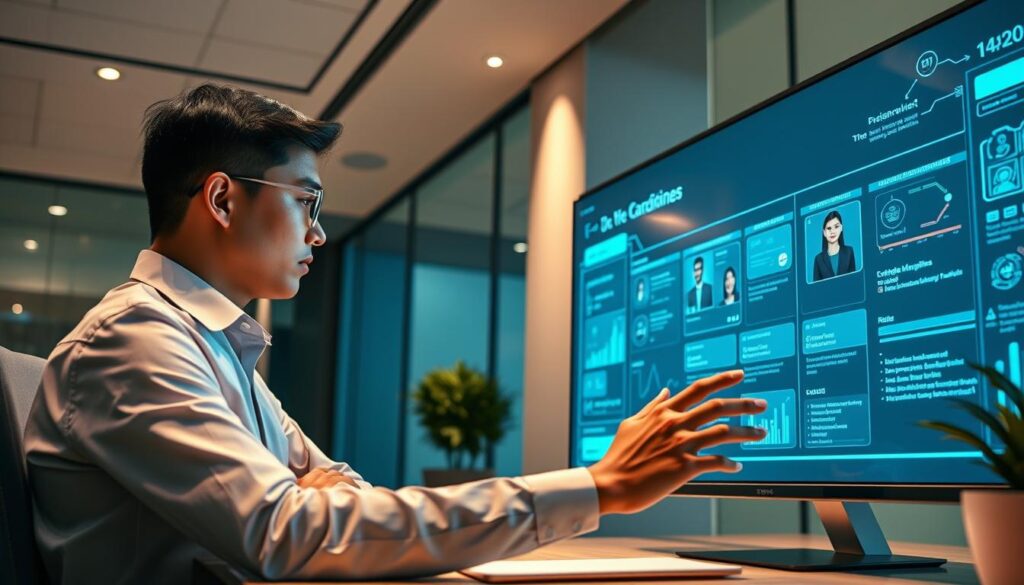What if the secret to better talent finding isn’t just about skilled HR teams? It could also involve the power of artificial intelligence. As companies face the complex world of hiring, using AI in Talent Acquisition is changing the game for HR support AI. By adopting these cutting-edge technologies, HR teams can work more efficiently, cut down on bias, and make smarter choices that lead to better hires. Let’s dive into how AI is changing HR and making talent finding more effective.
Key Takeaways
- AI in Talent Acquisition speeds up the hiring process and enhances recruitment strategies.
- Employing AI reduces bias and promotes fairness in hiring.
- Data-driven insights from AI tools help HR teams make more informed decisions.
- AI can automate essential administrative tasks, allowing HR professionals to focus on strategic roles.
- Continuous learning and development are supported by AI-powered personalized training programs.
- Ethical considerations must be taken into account when implementing AI in HR practices.
Introduction
Artificial intelligence is changing Human Resources in big ways. It’s a key part of the evolution of talent acquisition. Companies using AI in AI in hiring processes see better results. They get more efficient and find better candidates.
In Southeast Asia, businesses are using AI to improve hiring. These tools make processes faster, saving time on manual tasks. HR can then focus on more important work. This helps the company grow.
As the need for skilled workers grows, professionals must keep up with AI. They need to be ready for new challenges and chances.
To learn more about AI’s impact on hiring and keeping employees, check out this guide. AI is changing HR in big ways. It’s important for HR to adapt to these new tools for better hiring.
The Evolving Role of HR Professionals
HR professionals in Southeast Asia are seeing big changes. These changes come from new tech, like AI. It’s not just about using new tools. It’s about changing what HR means today.
Companies want to stay ahead by focusing on talent and keeping employees happy. This is where HR comes in.
Understanding New Responsibilities
HR roles are changing from just doing paperwork. Now, they use AI to make hiring better, help staff grow, and keep employees. It’s key for HR leaders to get AI, as 76% say it’s crucial for growth.
Transition from Administrative to Strategic Roles
HR is moving from just doing tasks to being strategic. Companies like EON are setting the pace. They want HR to help achieve big goals.
HR pros need to think ahead and align with business plans. This shows how important it is to keep up with these changes. For more on this, check out leadership in the age of AI.

AI in Talent Acquisition
AI tools in hiring are changing how we find and hire talent. They make the hiring process faster and more efficient. This lets HR teams work with more candidates without getting overwhelmed.
AI helps companies improve their hiring. It makes the process smoother and more organized. This is good for everyone involved.
Streamlining Recruitment Processes
AI makes finding and screening candidates much faster. It uses smart algorithms to sort through many applications. This way, it finds the best candidates quickly.
HR teams can then focus on talking to candidates and making decisions. This makes the hiring process faster and more organized.
Reducing Bias in Hiring
AI also helps reduce bias in hiring. It looks at past hiring data to find patterns of success. This helps make hiring fairer and more diverse.
Many companies in Asia use tools like HireVue. They help ensure hiring is both efficient and fair. This is important for creating a diverse and inclusive workplace.
Benefits of AI for HR Teams
Artificial Intelligence is changing HR practices for the better. It makes teams more efficient and productive. By automating simple tasks, HR can focus on important work that helps the company grow.
Being able to make decisions based on data is key today. This is because AI helps HR teams make better choices.
Increased Efficiency and Productivity
AI really helps in making HR teams more efficient and productive. It automates tasks like checking resumes and setting up interviews. This lets HR focus on more important tasks.
Companies like Telkom Indonesia have seen big improvements. They can manage their talent better and faster thanks to AI.
Improved Decision Making with Data-Driven Insights
AI helps HR make better decisions by using data. It gives insights into how employees are doing and what the company needs. This helps HR make choices that are good for the business.
Studies show that 93% of HR managers think AI is key to saving money. This approach helps the company run smoothly and meet its goals.
| AI Application | Impact on HR | Measurable Benefits |
|---|---|---|
| Resume Screening | Automates candidate evaluation | Time savings of up to 75% |
| Employee Performance Analysis | Provides analytic insights | Improved retention rates by 20% |
| Scheduling Automation | Reduces administrative overhead | Increased productivity of HR staff by 30% |
Automating Administrative Tasks
In today’s fast-paced world, automating HR tasks is key. Companies use AI to make their work more efficient and accurate. This lets HR teams focus on big-picture tasks, not just paperwork.
Document Management and Compliance
Managing documents and training on compliance is vital for HR. AI makes it easier to keep documents current and easy to find. This means HR can spend more time with employees and job seekers, not just paperwork.
Automating these tasks also cuts down on errors. It makes sure everything is done right, the first time.
Scheduling Interviews and Communication
AI is great at setting up interviews and keeping in touch with job seekers. It makes talking to candidates smoother and less complicated. This saves time and makes scheduling easier.
| Task Type | Traditional Process | AI-Powered Process |
|---|---|---|
| Document Management | Manual filing and tracking | Automated organization and compliance checks |
| Interview Scheduling | Back-and-forth emails | Instant scheduling and confirmations |
| Candidate Communication | Delayed responses | Real-time updates via chatbots |
Using AI for these tasks helps HR teams work better. It makes them more effective in finding and keeping talent.
AI-Powered Sourcing of Candidates
Finding the right talent in today’s job market is tough. AI is changing how companies find candidates. It uses smart algorithms to search through lots of data and social media. This helps HR teams find people who might not be looking for a job.
Leveraging Platforms for Finding Talent
Using AI platforms is key for finding the best candidates. Tools like LinkedIn’s analytics help find passive candidates. These platforms make it easier to find the right people and save time for HR teams.
Optimizing Job Descriptions
AI also helps make job ads better. It makes sure job postings are clear and welcoming. This way, companies can attract a wider range of qualified candidates.

| Platform | Benefits | Key Features |
|---|---|---|
| Access to a vast talent pool | Recruitment analytics, targeted job postings | |
| indeed | Greater visibility for job ads | Resume search, candidate alerts |
| Glassdoor | Enhanced employer branding | Company reviews, salary insights |
Enhanced Candidate Screening
Technology has changed how we hire, thanks to AI in resume screening. It makes checking candidates faster and more accurate. AI looks at resumes closely, finding the right skills and experiences for the job. This saves time and makes sure the right people are chosen.
AI Algorithms in Resume Review
AI algorithms quickly go through lots of resumes. They help teams find the best candidates fast. This frees up HR to focus on talking to candidates, making hiring better.
Chatbots for Initial Interactions
Chatbots make first talks with candidates better. They answer questions and check if candidates are a good fit early on. This helps in making better hiring choices. It makes hiring smoother.
AI Tools for Onboarding
Onboarding new employees is key to a positive work atmosphere. AI tools make this process better, making it smoother and more efficient. They automate tasks, so new hires can quickly get into their roles without getting bogged down by paperwork.
AI solutions offer a personalized onboarding experience. Companies use AI chatbots to answer new employees’ questions anytime. This support makes new employees feel welcome, which helps keep them with the company. This approach is becoming popular not just in the Philippines but across Southeast Asia.

Improving Employee Engagement with AI
AI is now key for HR teams to boost employee engagement. It helps gather feedback and analyze trends in real-time. This way, companies can understand what their employees think and feel, making the workplace better.
Feedback Collection and Trend Analysis
AI makes it easy for HR to collect feedback. Surveys and data analysis show how happy and engaged employees are. This gives both numbers and stories that show what’s really going on at work.
By looking at these trends, HR can act fast. They can spot issues that might hurt productivity or make people want to leave. For example, if morale changes, HR can take steps to make employees happier.
In Asia, companies are seeing the value of AI in their engagement plans. They use it to create a culture that values everyone’s well-being. This makes the workplace more inclusive and caring.
AI in Continuous Learning and Development
Continuous learning is key to improving workforce skills. AI helps create customized growth paths for each employee. It identifies specific skill gaps, making upskilling more focused.
Using AI in learning and development encourages a culture of improvement. It’s perfect for today’s fast-changing work world.
Personalized Training Programs
Personalized training programs boost employee engagement and performance. AI analyzes learning habits to create customized content and delivery. This leads to:
- Increased Retention: Tailored programs improve knowledge retention, making learning more effective.
- Employee Satisfaction: Workers feel valued when their training matches their goals.
- Skill Relevance: Continuous updates keep training current with industry needs.
Companies using AI in learning and development make upskilling more efficient. They build a resilient workforce ready for new challenges. This forward-thinking makes them leaders in innovation, preparing their workforce for the future.

Challenges and Ethical Considerations of AI in HR
Artificial intelligence is changing HR for the better, but it also brings big challenges. Privacy is a major worry as companies collect lots of data on people. Keeping this data safe is not just about following rules; it’s about doing the right thing.
There’s also the issue of bias in AI. If old data shows unfair treatment, AI might keep doing the same thing. It’s important for HR leaders to understand these risks to make hiring fair and open to everyone.
Even with more tech, keeping a human touch in HR is key. It’s about finding the right balance between tech and personal connection. Being open and ethical is crucial for earning trust from employees and job seekers.
| Challenge | Description | Ethical Consideration |
|---|---|---|
| Privacy Concerns | Protecting sensitive data is crucial. | Follow data protection laws. |
| Algorithm Bias | Bias in AI can lead to unfair hiring. | Check AI systems for bias regularly. |
| Lack of Transparency | Not knowing how AI works can hurt trust. | Be clear about AI’s decision-making. |
| Human Touch | Too much tech can make HR feel cold. | Use friendly AI with human interaction. |
Preparing for the Future of AI in HR
Companies ready to use AI in HR need to plan carefully. They must first understand their current HR processes. This helps them see where AI can make a big difference.
Choosing the most important areas for AI can make things run smoother. It also makes work more efficient.
Steps for Integration of AI
Adding AI to HR needs a clear plan. Begin by checking how things work now. Look for chances to make things better with AI.
Working with IT teams helps AI fit in smoothly. A step-by-step plan helps avoid big problems. It makes things more efficient little by little.
Training and Development for HR Leaders
Teaching HR leaders about AI is key. Special programs help them use AI well. These should cover both tech skills and how to handle change.
By training, companies show they’re ready for new ideas. This prepares them for AI’s role in HR’s future.
Conclusion
As we finish our look at AI changing HR, it’s clear AI is a big deal for companies. It’s making talent acquisition better and changing how we make decisions and interact with employees. Now, HR folks can spend more time on big ideas and less on routine work.
AI in HR does more than just save time. It helps improve how we connect with employees, makes hiring fairer, and gives us insights for better leadership. Companies in Southeast Asia that use AI will likely get the best talent. This helps them stay ahead globally.
The future of HR looks bright with AI leading the way. HR’s role will become even more important as AI gets better. This is just the start of how AI can change finding and keeping great talent.

